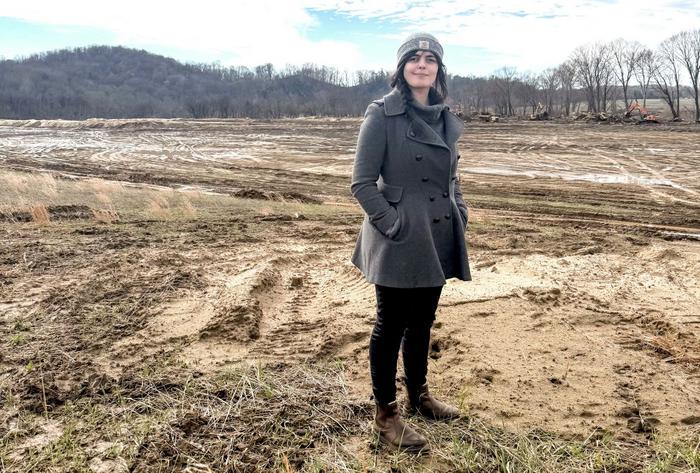In the wake of unprecedented flooding caused by Hurricane Helene, researchers from the University of Tennessee Institute of Agriculture (UTIA) have embarked on a mission of critical importance to agricultural resilience in the region. After the hurricane inflicted damages estimated to exceed $1.3 billion on Tennessee’s farming landscape, a team led by assistant professor Eminé Fidan is dedicated to studying the long-term impacts of sediment deposition on crops and soil health. Their efforts are backed by a substantial $275,000 grant from the U.S. Department of Agriculture.
The floodwaters left behind a considerable amount of sediment, comprising sand and silt that significantly disrupted the soil quality essential for the growth of key crops such as tomatoes, soybeans, corn, and tobacco. With several counties, including Cocke, Greene, Unicoi, and Washington, being severely affected, the research team is tasked with investigating how these deposits affect agricultural productivity. The sediment analysis will inform strategies to manage soil health and improve water quality, which is crucial in regions where surface waters are a primary irrigation source.
To tackle these pressing challenges on the ground, the researchers are working closely with local Extension agents and farmers. The engagement with community members is a critical aspect of their approach, aiming to improve resilience against future weather-related disruptions. With agriculture being the backbone of Tennessee’s economy, developing effective management strategies for the sediment that flooded the fields is of utmost importance not just for immediate recovery but also for long-term sustainability.
In addition to sediment analysis, the UTIA team is conducting extensive economic impact assessments and geographic information system (GIS) modeling. This multidimensional approach allows them to paint a comprehensive picture of the flood’s repercussions on the agricultural landscape and provides data-driven insights for farmers to draw upon. The focus on education and outreach has also led to a deeper investigation into the soil’s contamination levels, posing an essential line of inquiry following the flood.
Categories of research include the analysis of contaminants within the sediment deposited during the flooding events. The implications of these contaminants can be far-reaching, affecting not only crop yields but also food safety, further emphasizing the urgency of their work. The research team’s endeavors are not merely academic but are intended to translate into actionable strategies, offering farmers a lifeline in navigating the recovery phase.
At the core of their initiatives, the team aims to convene a field day that showcases the findings and insights gleaned from their research. Scheduled for August 20, 2025, this event will not only highlight the practical applications of their scientific investigations but will also serve as a platform for community engagement. Farmers will have the opportunity to share experiences and benefits derived from implementing the proposed recovery measures.
Moreover, the work of Fidan and her colleagues epitomizes the importance of interdisciplinary collaboration in addressing issues that transcend traditional boundaries. By bringing together ecologists, soil scientists, and Extension specialists, their team exemplifies how collective expertise can yield innovative solutions to complex problems in agroecosystem recovery. This initiative also reflects a broader trend within scientific communities towards integrating localized knowledge and community dynamics into research narratives.
In addition to evaluating soil and sediment, the recovery initiative includes exploring alternative agricultural practices and state-of-the-art technologies like drone seeding systems and biochar production. These innovative practices are vital for modernizing the recovery approach, showcasing how technology can effectively address challenges posed by climate-related events. By demonstrating successful applications through practical demonstrations at the field day, the team hopes to inspire local producers and strengthen community networks.
Their mission extends beyond mere agricultural recovery; it also involves safeguarding public health. The researchers understand that the implications of their findings have a profound impact on the well-being of the community. By providing local farmers and stakeholders with valuable insights into managing contaminant risks, they aim to foster a safe and sustainable agricultural environment.
As they advance, the UTIA team remains committed to involving local producers and stakeholders in the recovery process. By maintaining a dialogue with the agricultural community, they seek to ensure their recommendations are relevant and applicable. This engagement also fosters a sense of shared purpose and collective action toward overcoming the challenges associated with natural disasters and their aftermath.
The ongoing research and upcoming field day collectively represent a concerted effort to restore hope and functionality to a beleaguered agricultural community. With the momentum gained through the USDA grant and involvement from various faculties within the University of Tennessee, this initiative is poised as a model for how academic institutions can play pivotal roles in local recovery efforts following significant environmental disruptions.
As the team wraps up their studies and prepares for the field day, they embody the essence of resilience in the face of challenges. Their dedication not only serves the immediate needs of farmers impacted by Hurricane Helene but also sets a precedent for future recovery efforts in the aftermath of climate-driven disasters, ensuring that agricultural communities can weather the storms of tomorrow.
Subject of Research: Impact of Hurricane Helene on agricultural land in Tennessee
Article Title: Recovering from Hurricane Helene: Resilience in Tennessee’s Agricultural Sector
News Publication Date: October 2023
Web References: University of Tennessee Institute of Agriculture
References: N/A
Image Credits: Photo by D. McIntosh, courtesy UTIA
Keywords
Agriculture, Environmental Sciences, Ecology, Applied Ecology, Plant Sciences




